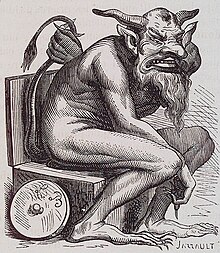胡適似乎故意將他從義大利 Belphegor 一書中
同名的 Machiavelli故事 (精采)告訴胡頌平
1961/4/13

Belphegor illustration from the Dictionnaire Infernal
Belphegor originated as the Assyrian Baal-Peor, the Moabitish god to whom the Israelites became attached in Shittim (Numbers 25:3), which was associated with licentiousness and orgies. It was worshipped in the form of a phallus. As a demon, he is described in Kabbalistic writings as the "disputer", an enemy of the sixth Sephiroth "beauty". When summoned, he can grant riches, the power of discovery and ingenious invention. His role as a demon was to sow discord among men and seduce them to evil through the apportionment of wealth.[citation needed]
Belphegor (Lord of the Opening) was pictured in two different fashions: as a beautiful young woman or as a monstrous, bearded demon with horns and sharply pointed nails; the former form, according to most sources, was his earthly disguise when invoked by mortals. According to De Plancy's Dictionnaire Infernal, he was Hell's ambassador to France. Belphegor also figures in Milton's Paradise Lost and in Victor Hugo's The Toilers of the Sea.[citation needed]
According to legend, Belphegor was sent from Hell by Pluto to find out if there really was such a thing on earth as married happiness. Rumor of such had reached the demons but they knew that people were not designed to live in harmony. Belphegor's experiences in the world soon convinced him that the rumor was groundless. The story is found in various works of early modern literature, hence the use of the name to apply to a misanthrope or a licentious person.[citation needed]
Belfagor arcidiavolo aka Il demonio che prese moglie is a short story written in 16th century by Niccolò Machiavelli.
沒有留言:
張貼留言